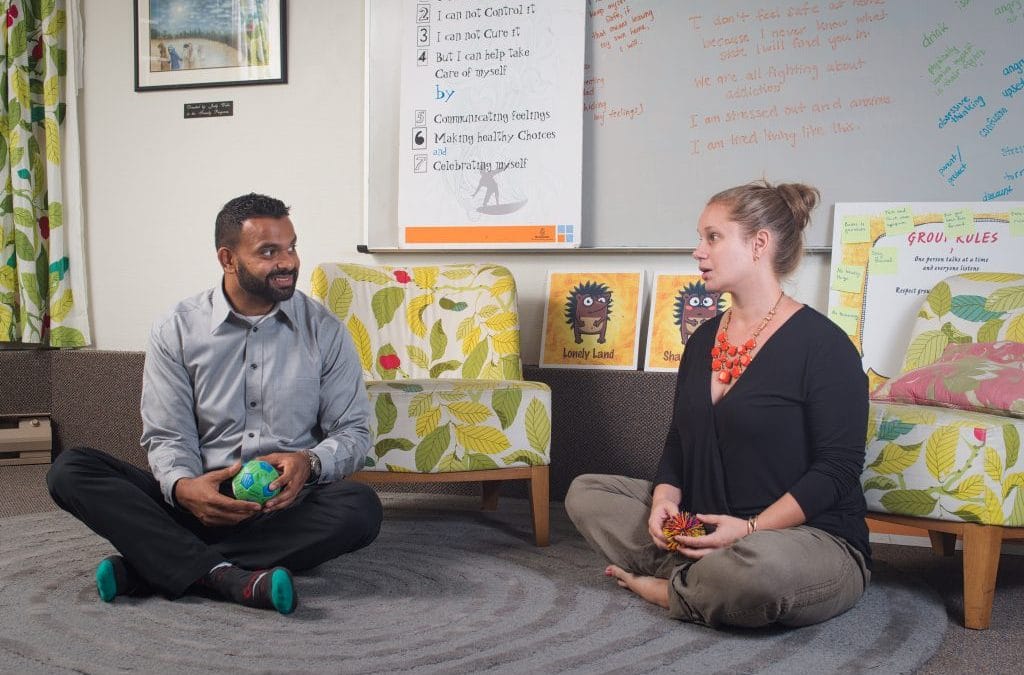I have chosen to work with children not because I believe I need to step into their lives and help them, but because their strength and resiliency is both boundless and awe-inspiring. I am in the enviable position to witness this strength and resilience as a therapist in the Children’s Healthy Coping Skills Program at Renascent. Children growing up in homes where addiction is present have no choice but to push their strength and resilience to the limit in order to cope and survive the challenges that come with fear, sadness, disappointment, neglect, and sometimes violence. Our concern in the Children’s Program is that a child’s resilience is used against them by the monster that is addiction. Instead of being used to create, build, and find joy, strength and resilience are used to find ways to survive, and survival becomes the norm. Survival takes the guise of perfectionism or acting out in negative ways; both serve to draw attention away from that addiction and over to the child, where attention is desperately needed. Our program’s primary purpose is to put a child’s focus back where it belongs. With the loving support of their families, children are reminded that their primary focus in life is to love, be loved, learn, and have fun.
It is my distinct privilege to see families transform as the make their way through our four-day Children’s Healthy Coping Skills Program, always hosted at the Wright Centre, our beautiful family treatment centre in the heart of downtown Toronto. Children nervously arrive with their parents at 9 a.m. on Thursday, not really knowing what to expect. That nervous energy is always transformed into joy and excitement by the end of their first day when children learn that addiction is a disease and they have bonded with other children who share a very similar experience. These children have usually been carrying addiction with them as a family secret and are relieved to find a place where they can speak openly with other people about this aspect of their lives. Children also learn about safe people in their lives with whom they can share their experiences and feeling (not everyone is safe), and about the 7C’s. The seven C’s state, “I did not cause it, I can’t control it, I can’t cure it, but I can help take care of myself by communicating my feelings, making healthy choices, and celebrating myself.” In this manner, children are reminded of their role and responsibilities in relation to the presence of addiction in their lives. Children are relieved to learn that none of their actions have caused an adult to use a substance (though they are sometimes given that message by the adults in their lives), there is not anything they can do to control the substance use — such as acting out or being absolutely perfect at everything — and there is no cure for the disease. Children are given a great deal of hope when they find out that there is hope even if there is no cure. They learn about abstinence-based treatment and twelve step programs and they meet counsellors and other adults who have lived long periods of time free from substances. Children are also given hope for the future when they learn about making healthy choices, not only in relation to alcohol and other substances, but to fundamental lifestyle habits as well, such as food and sleep. They also practise and learn the benefits of communicating feelings, and how essential it is to not keep their feelings bottled up inside.
By the end of our Children’s Healthy Coping Skills Program at Renascent, children join their adult loved ones to work on a project together. This is where they begin to practice the skills they have learned while in the program, and are gently coached through complex emotional interactions in a safe manner. It is this safety that allows children to refocus their strengths and resiliencies again. I cannot state enough how glorious a thing it is to see children make their way through the amazing process of the Renascent Children’s Healthy Coping Skills Program.

